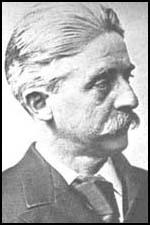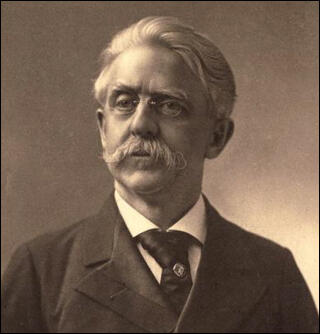Henry Demarest Lloyd

Henry Demarest Lloyd was born in New York City on 1st May, 1847. His father was a minister in the Dutch Reformed Church but in 1860 he left and opened a small bookshop.
After graduating from Columbia College in 1867 Lloyd entered Columbia Law School. He passed his New York bar examination in 1869 and was employed as an assistant secretary to the American Free Trade Association. He also joined the Young Men's Municipal Reform Association, which helped to overthrow William Tweed, the corrupt mayor of New York.
In 1872 Lloyd joined the Chicago Tribune. He worked as literary editor (1872-74). Lloyd married Jessie Bross and in 1875 she gave birth to William Bross Lloyd. In 1874 he became financial editor of the newspaper. During this period he was influenced by the ideas of Ralph Waldo Emerson and the Christian Socialists in Britain. Lloyd became the newspaper's chief editorial writer in 1880.
While working for the Chicago Tribune Lloyd published a series of articles exposing corruption in business and politics. This included The Story of a Great Monopoly (1881) and The Political Economy of Seventy-Three Million Dollars (1882) in the Atlantic Monthly and Making Bread Dear (1883) and Lords of Industry (1884) in the North American Review. These articles caused a stir and Lloyd has been described as America's first investigative journalist.
He continued to write for the Chicago Tribune until resigning in 1885 as a result of political differences with its principal owner,Joseph Medill. Over the next few years Lloyd took part in the campaign to bring an end to child labour and to achieve clemency for the men accused of the Haymarket Bombing. He was also a strong supporter of women's suffrage and the trade union movement. A close friend of Jane Addams, Lloyd provided free lectures at the Hull House Settlement in Chicago.

Lloyd became a leading figure in the reform movement and influenced a generation of political activists including John Peter Altgeld, Clarence Darrow, William Dean Howells and John Dewey. When Altgeld was elected governor of Illinois in 1892 he offered Lloyd the post as the state's first chief factory inspector. However, Lloyd declined the offer and suggested his friend Florence Kelley for the post.
Lloyd several books in favour of progressive reform including A Strike of Millionaires Against Miners (1890), Wealth Against Commonwealth (1894), Labor Co-Partnerships (1898) and A Country Without Strikes (1900).
Henry Demarest Lloyd died of pneumonia in Chicago on 28th September, 1903.
Primary Sources
(1) Florence Kelley, Survey Magazine (June, 1927)
Hull House was, we soon discovered, surrounded in every direction by homework carried on under the sweating system. From the age of eighteen months few children able to sit in high chairs at tables were safe from being required to pull basting threads. Out of this enquiry, amplified by Hull House residents and other volunteers, grew the volume published under the title Hull House Maps and Papers.
The discoveries as to home work under the sweating system thus recorded and charted in 1892 led to the appointment at the opening of the legislature of 1893, of a legislative commission of enquiry into employment of women and children in manufacture, for which Mary Kenney and I volunteered as guides. With backing from labour, from Hull House, from Henry Demarest Lloyd and his friends, the Commission and the report carried almost without opposition a bill applying to manufacture, and prescribing a maximum working day not to exceed eight hours for women, girls, and children, together with child labour safeguards based on laws then existing in New York and Ohio.
When the new law took effect, and its usefulness depended on the personnel prescribed in the text to enforce it, Governor Altgeld offered the position of chief inspector to Henry Demarest Lloyd, who declined it and recommended me. I was accordingly made chief state inspector of factories, the first and so far as I know, the only woman to serve in that office in any state.
(2) Samuel Jones, the successful businessman and four-term mayor of Toledo, Ohio, was one of the first to try and introduce socialist ideas to local government. In his article, The New Patriotism: A Golden-Rule Government for Cities, he quoted Henry Demarest Lloyd on the subject of anarchy.
The ethics of the wild beast, the survival of the strongest, shrewdest, and meanest, have been the inspiration of our materialistic lives during the last quarter or half century. The fact in our national history has brought us today face to face with the inevitable result. We have cities in which a few are wealthy, a few are in what may be called comfortable circumstances, vast numbers are propertyless, and thousands are in pauperism and crime. Certainly, no reasonable person will contend that this is the goal that we have been struggling for; that the inequalities that characterize our rich and poor represent the idea that the founders of this republic saw when they wrote that "All men are created equal."
The competitive idea at present dominant is most of our political and business life is, of course, the seed root of all the trouble. The people are beginning to understand that we have been pursuing a policy of plundering ourselves, that in the foolish scramble to make individuals rich we have been making all poor. "For a hundred years or so," says Henry Demarest Lloyd, "our economic theory has been one of industrial government by the self-interest of the individual; political government by the self-interest of the individual we call anarchy." It is one of the paradoxes of public opinion that the people of America, least tolerant of this theory of anarchy in political government, lead in practicing it in industry.
© John Simkin, April 2013

